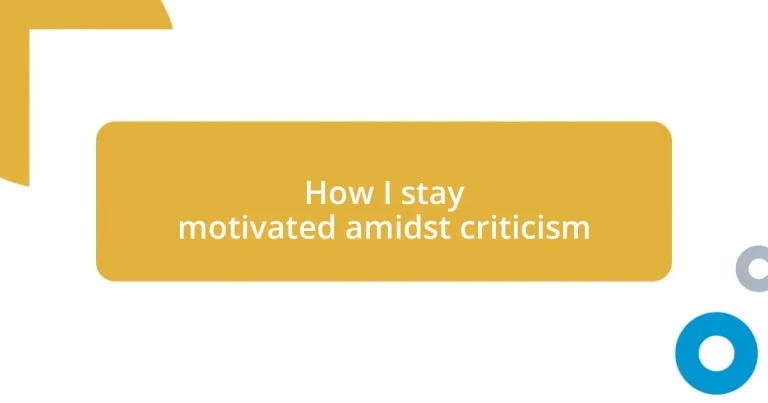Key takeaways:
- Criticism can be perceived as either a deterrent or a catalyst for growth, depending on our response to it.
- Identifying and aligning with personal values helps channel criticism into constructive pathways and fosters deeper connections.
- Practicing regular self-reflection is essential for transforming negative feedback into actionable steps for improvement and motivation.
- Celebrating small victories boosts motivation and reinforces progress, creating a supportive community that acknowledges achievements.
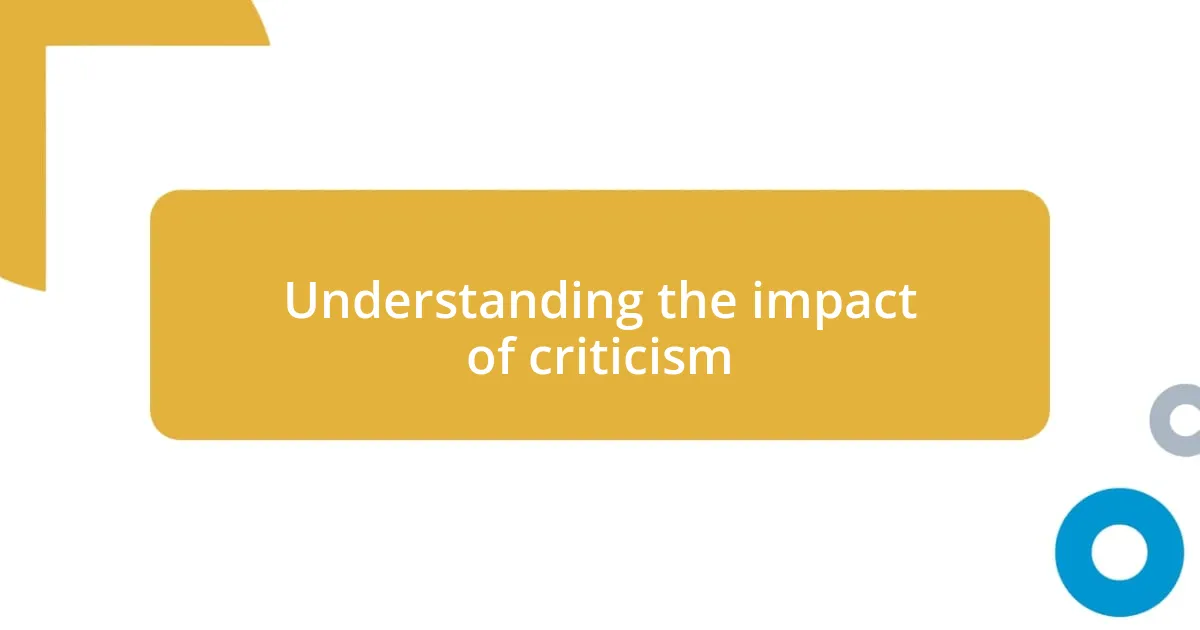
Understanding the impact of criticism
Criticism can often feel like a weight pressing down on us. I remember when I shared my first project at work, and a colleague pointed out several flaws. Initially, it stung. But over time, I realized that these insights, although hard to hear, were essential for my growth. Isn’t it interesting how we often see criticism as a reflection of our worth instead of a stepping stone for improvement?
It strikes me that criticism can either derail us or push us forward, depending on how we perceive it. I’ve had times when negative feedback left me questioning my skills and decisions. However, I’ve also experienced moments where I took criticism as a challenge to refine my work. Have you ever found yourself at a crossroads after receiving feedback? It can be eye-opening to recognize that our response to criticism shapes our journey.
When I think about the emotional impact of criticism, I feel a mix of vulnerability and resilience. There’s something powerful about confronting uncomfortable truths about our work or ourselves. Each encounter with criticism has taught me to sift through the noise, focus on constructive elements, and stand firm in my purpose. I often ask myself, how can I convert this criticism into a motivator rather than a deterrent? The answer lies in our willingness to embrace vulnerability and seek growth.
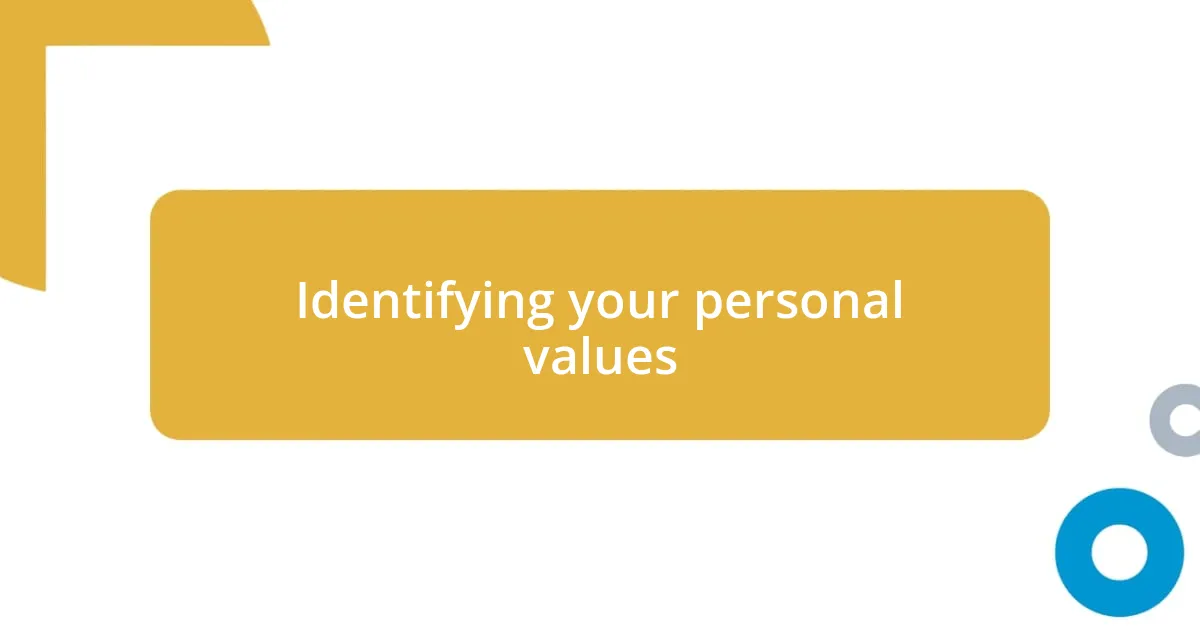
Identifying your personal values
Identifying personal values is crucial when it comes to staying motivated amidst criticism. I remember a time during my college years when a professor critiqued my presentation harshly. Instead of dwelling on the negative feedback, I reflected on my core values—like creativity and resilience. It was a revelation for me; understanding what truly mattered allowed me to see past the criticism and focus on my growth.
When I align my actions with my personal values, it feels empowering. For instance, I’ve always valued collaboration. Recalling a group project that went awry due to disagreements, I realized that if I had prioritized open communication, the entire experience might have transformed positively. Such realizations help me channel criticism into constructive pathways that reinforce my values rather than undermine them.
Ultimately, the journey of identifying personal values isn’t just introspective; it’s relational. I find it fascinating how sharing my values with others often invites a deeper connection, even in situations of critique. For instance, during a challenging team meeting, I disclosed my commitment to honesty and transparency, which fostered an environment that encouraged honest feedback without criticism feeling personal. This approach was transformational, allowing us all to grow together rather than against each other.
| Aspect | Personal Value |
|---|---|
| Growth | Resilience |
| Collaboration | Open Communication |
| Honesty | Transparency |
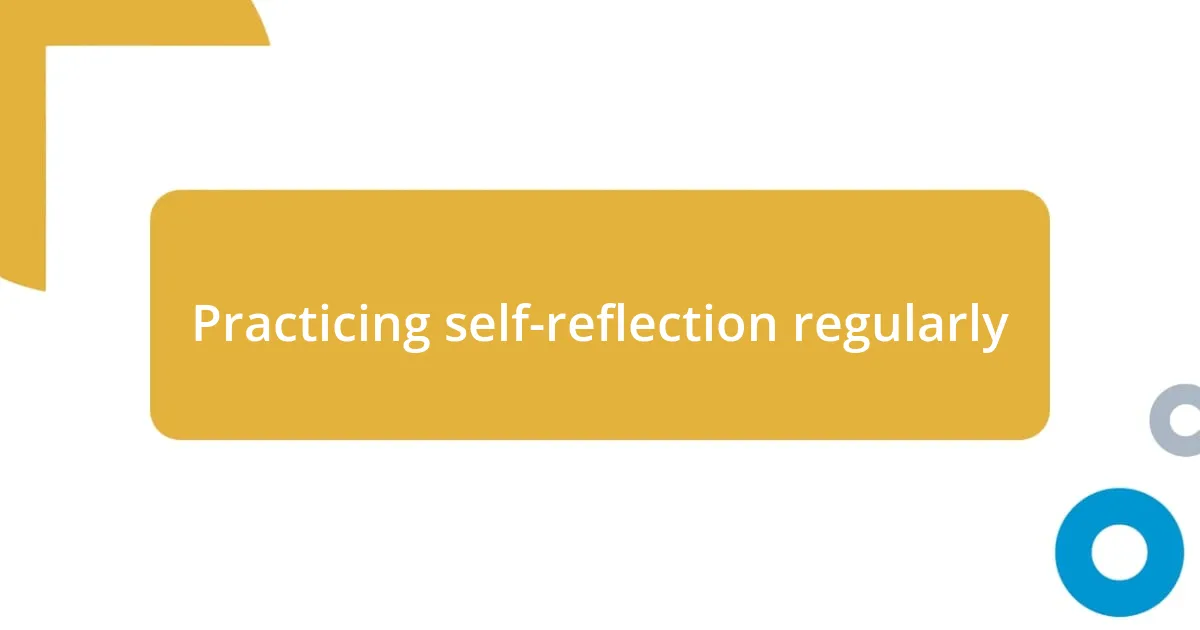
Practicing self-reflection regularly
Practicing self-reflection regularly is something I can’t emphasize enough. I often set aside time at the end of each week to review my experiences, especially those involving criticism. During these moments, I dig deep into my emotions and thoughts. Recently, after receiving critical feedback on a project, I reflected on my initial feelings of disappointment but later recognized the opportunity for growth. It’s amazing how self-reflection can transform a sting into a roadmap for improvement.
- Look for patterns in feedback: I jot down recurring themes in critiques to identify areas for constant growth.
- Assess emotional triggers: Understanding what feedback evokes strong emotions helps me manage reactions better.
- Set personal goals: Reflecting on my experiences guides me to establish actionable goals moving forward.
- Celebrate progress: Acknowledging achievements, however small, through reflection keeps me motivated amidst challenges.
By engaging in this regular practice, I find clarity and motivation even in the face of negativity. The idea that my thoughts can be a catalyst for resilience is something I cherish. Every time I reflect, it’s like peeling back layers of an onion—I discover more about myself and my ability to grow.
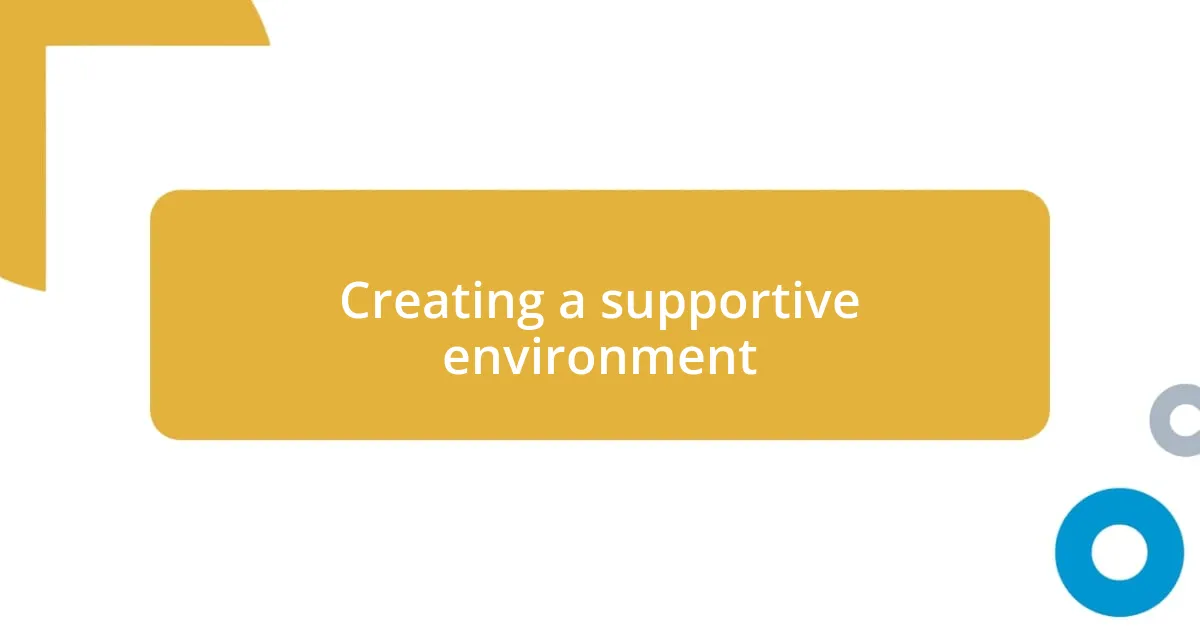
Creating a supportive environment
Creating a supportive environment is essential for weathering criticism. In my experience, surrounding myself with positive influences has made a world of difference. I recall attending a workshop where the facilitator encouraged us to share our critiques—on ideas, not individuals. That environment felt liberating, as it transformed critical feedback into constructive conversations. Why can’t we create spaces like this everywhere?
Another aspect that I’ve found beneficial is aligning with like-minded individuals. I remember joining a local writers’ group where we openly discussed our work, celebrating both successes and failures. It was in this welcoming atmosphere that I learned to see criticism as a friend rather than a foe. Every piece of feedback served as a stepping stone, pushing me to refine my craft and view challenges through a new lens—how can we lift each other higher rather than compete?
Lastly, I believe in the power of creating physical spaces that foster creativity and connection. When I revamped my home office, I added personal touches; photos of support networks, motivational quotes, and even art that inspires me. These elements serve as daily reminders that I’m not alone in my journey. So, have you considered what your surroundings say about your support system? It’s incredible how much a nurturing environment can uplift your spirit, allowing you to rise above criticism with renewed strength.
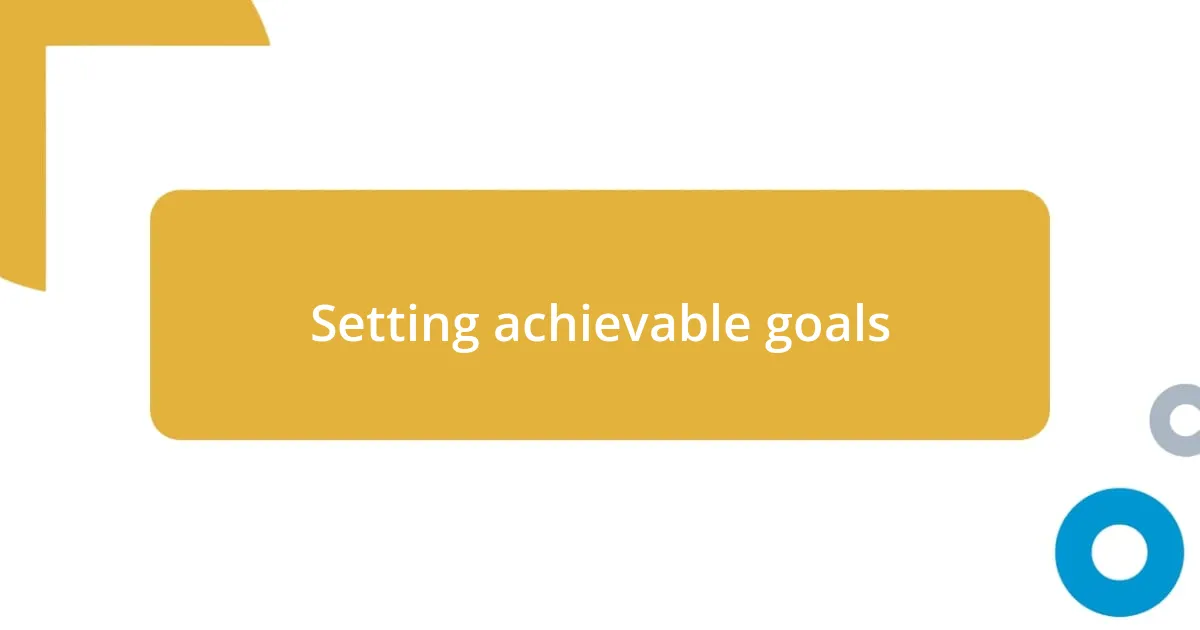
Setting achievable goals
Setting achievable goals requires a careful blend of realism and ambition. When I first started setting goals, I remember feeling overwhelmed by the enormity of my aspirations. Instead of aiming for the stars right away, I broke down my larger objectives into smaller, manageable tasks. For example, rather than telling myself I needed to complete a novel, I set a goal to write just 500 words a day. This made the process feel less daunting and more achievable, fostering a sense of accomplishment that kept me moving forward.
Another method that has worked for me is utilizing the SMART criteria—Specific, Measurable, Achievable, Relevant, Time-bound. I discovered this approach during a goal-setting workshop a few years back, and honestly, it changed how I view my ambitions. When I decided to improve my public speaking skills, I set a specific goal to deliver three presentations within the next six months. That clarity not only made my goal measurable but also kept me accountable, and by the end of that period, I had not just met but exceeded my expectations.
Moreover, I’ve learned to embrace flexibility in my goal-setting. Life often throws curveballs, and I’ve had my fair share of setbacks. When my original goals became unfeasible due to unexpected challenges, I realized the importance of adjusting them without feeling defeated. For instance, after facing personal struggles, instead of quitting my writing altogether, I shifted my focus to journaling daily. This adaptation reignited my passion for storytelling in a way that felt authentic and motivating. Have you ever adjusted a goal just when you felt like giving up? Taking those experiences and re-framing them into new, achievable goals can breathe new life into your motivation.
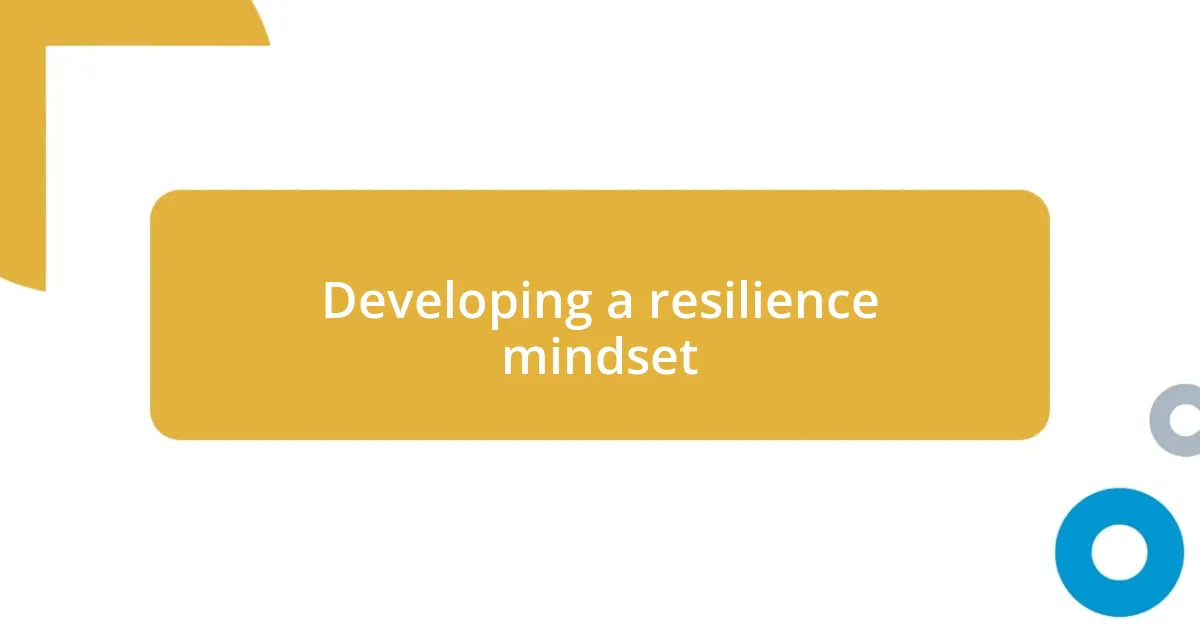
Developing a resilience mindset
Building a resilience mindset is all about perspective. I remember a time I faced harsh criticism on a project I poured my heart into. Instead of dwelling on the negativity, I asked myself, “What can I learn from this?” Shifting my focus from the criticism to potential growth transformed my emotional response, making me stronger and more open to feedback in the future.
It’s fascinating how resilience can be cultivated through reflection and self-compassion. When I encounter setbacks, I often pause to assess my feelings instead of ignoring them. I recall one instance where I felt discouraged after receiving mixed reviews on a presentation. I took a moment to journal my thoughts, allowing myself to feel disappointed, but then I flipped the script by identifying what went well. Practicing this kind of self-reflection not only nurtured my resilience but also reaffirmed my self-worth. Have you tried this approach? It can be a game-changer.
Moreover, I believe that resilience thrives when we embrace challenges as opportunities. About a year ago, I participated in a public speaking event that was completely outside my comfort zone. Initially, the fear of judgment loomed large. Yet, anticipating the worst, I reminded myself that every speaker had faced similar fears. By treating that experience as a chance to grow, I found courage that surprised me, and I walked away with newfound confidence. How do you turn your challenges into stepping stones? It’s all about the mindset shift we choose to adopt.
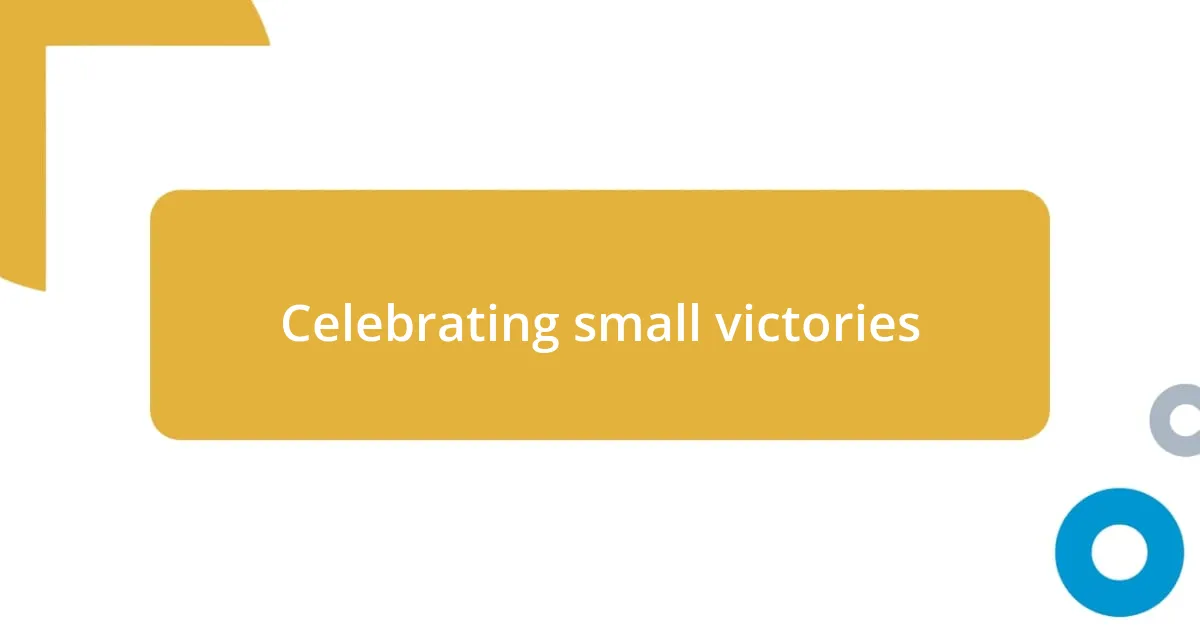
Celebrating small victories
Celebrating small victories can be a powerful motivator, especially when facing criticism. I recall a project where my initial drafts were met with skepticism from colleagues. Instead of spiraling into self-doubt, I chose to celebrate the completion of each draft, no matter how imperfect. Each small milestone gave me a sense of progression and encouraged me to keep refining my ideas, proving that gradual improvements can lead to significant outcomes.
In my journey, I’ve learned the art of acknowledging progress, however minor. After a particularly grueling week of writing, I would reward myself by taking a moment to reflect on what I’d accomplished, like finishing a chapter or mastering a new writing technique. This simple practice transformed my perspective; instead of fixating on the overwhelming task ahead, I focused on what I had already achieved. Have you ever felt that rush of satisfaction from completing a small but challenging task? It’s remarkable how such moments can ignite our motivation and creativity.
Moreover, I find it essential to share these small victories with others. Recently, after finally completing a difficult presentation, I posted about it on social media. The supportive comments and likes warmed my heart and reinforced that my efforts were appreciated, no matter what critics might say. Engaging with a community that celebrates each other’s milestones can bring a sense of belonging and validation, reminding us that every step forward is worth acknowledging. How do you celebrate your small wins? Sometimes, just a simple acknowledgment can help keep the momentum going.












